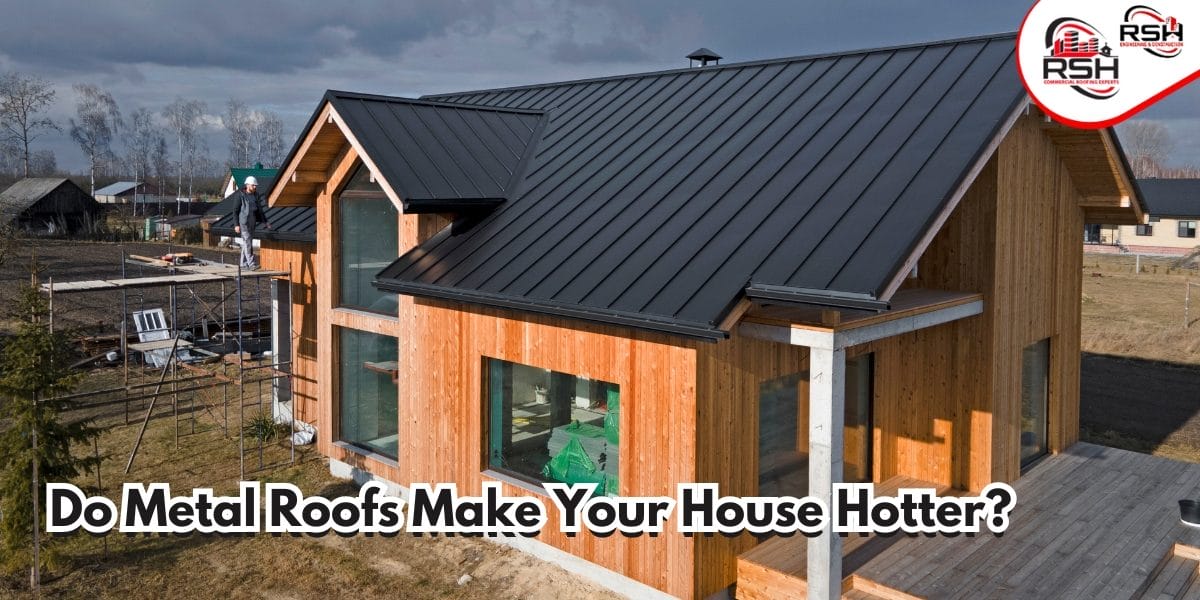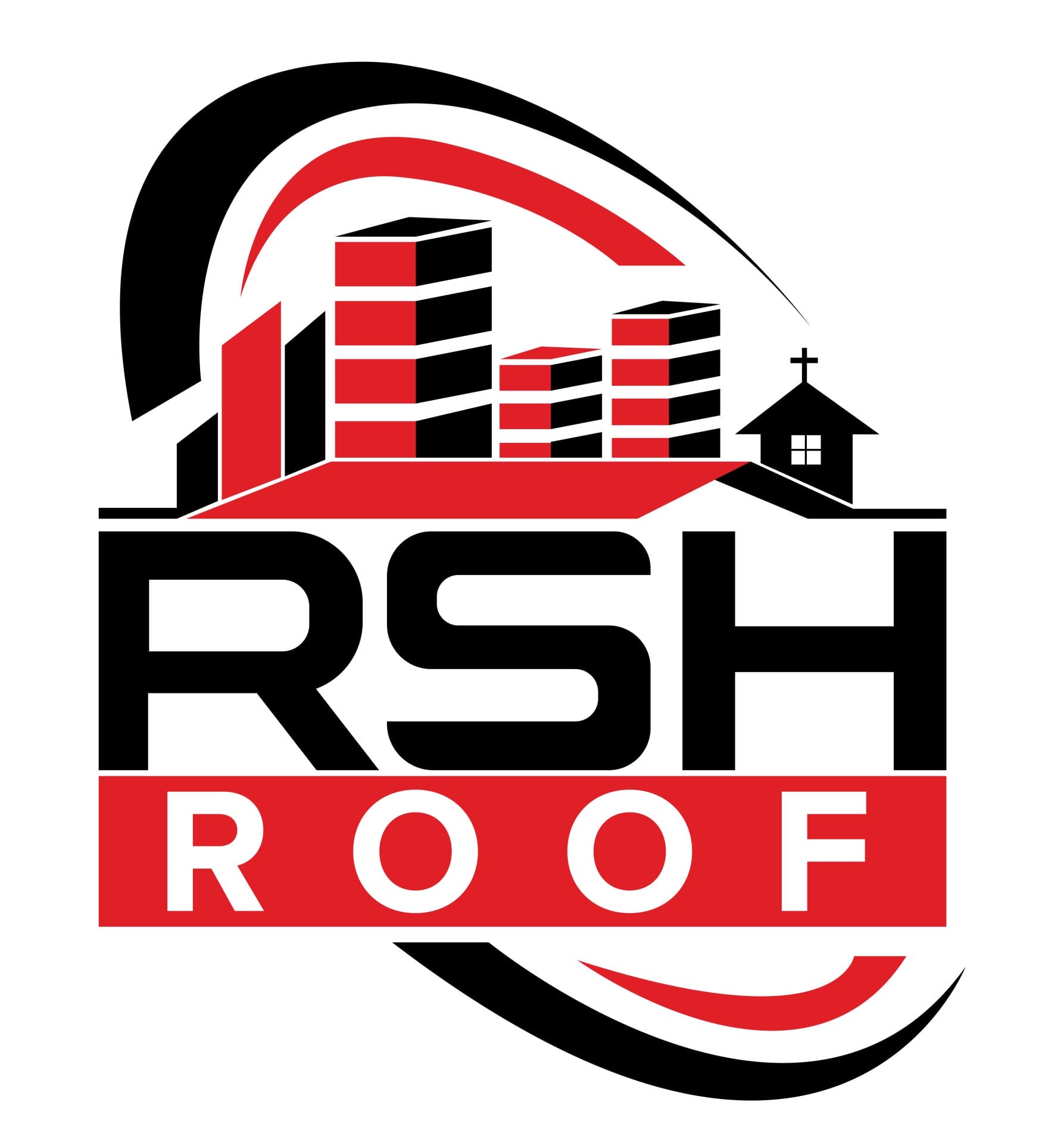RSH Commercial Roofing is a Professional Engineering & Construction Company with 25+ years of experience that specializes in Commercial & Residential Roof Inspections, Repair/Replacement services as well as commercial roofing insurance claims.

Do Metal Roofs Make Your House Hotter?
Now, people are picking metal roofs for their homes due to their durability, long lifespan, and modern aesthetic features. But a common question they daily deal with: “Do metal roofs make your house hotter?” The answer isn’t as easy as to say yes or no because several factors come up in a queue, such as the metal roofs heat color, insulation, and the climate you live in.
To know whether metal roofs contribute because of the high temperatures inside your home and how you can make informed decisions if you’re considering one. Let’s go deeply with a thorough understanding.
The Science Behind Metal Roofs and Heat
We read in science that metal is a natural conductor of heat. This states that a metal roof could widely absorb heat more than other materials like asphalt or clay. However, the inner side heat of the metal roof depends on multiple factors, i.e., your home’s interior.
For example, a metal roof receives direct sunlight and absorbs the sun’s heat. Still, the way the metal roof is placed, insulated, and coated plays a significant role in affecting how much heat enters your home. Modern metal roofs often come with energy-efficient designs that minimize heat absorption.
Factors That Influence Heat Absorption
To clarify whether a metal roof will make you make a better decision about installing metal roofs or not, let’s break down the factors that influence metal roofs heat absorption:
Certain Factors That Influence Heat Absorption:
Roof Color:
Darker colors absorb more heat than lighter colors. Installing a black metal roof will indeed attract more heat than a white or light-colored roof. This concludes it is true for any roofing material, not just metal.
Reflective Coatings:
Metal roofs can be coated with special reflective paint or finishes that bounce off solar heat instead of absorbing it. These coatings, also known as “Cool Roofs,” are designed to reduce the amount of heat absorbed into the home, keeping temperatures cooler even on sunny days.
Insulation:
A well-insulated roof will prevent most of the heat absorbed by the metal from entering your living space. Insulation acts as a barrier that keeps the warm air out in the summer and the cool air inside.
Ventilation:
Proper roof ventilation also plays a genuine role in keeping your home cool. Ventilation systems allow warm air to escape, reducing the heat that could be transferred into your metal roof for house.
Climate:
The climate you live in can impact the effectiveness of a metal roof. In cooler climates, the metal roof’s ability to absorb metal roofs heat can be a benefit during climates. Additional reflective coatings and ventilation systems may be required.
The Benefits of Metal Roofs
Despite concerns over heat absorption, metal roofs offer several benefits that may outweigh any potential for making your home water. Let’s look at some of these benefits:
Energy Efficiency:
Metal roofs can be designed to reflect heat rather than absorb it, especially with the application of reflective coatings. When combined with proper insulation, metal roofs can help reduce your metal roof energy savings costs by keeping your home cooler in the summer.
Durability:
Metal roofs are incredibly durable and can last up to 50 years or more. They resist wind, rain, snow, and even fire, and this makes them a long-term investment for homeowners who want to avoid frequent roof repair specialist or roof replacement.
Eco-Friendly:
Many metal roofs are made from recycled materials and are 100% recyclable at the end of their lifespan. Additionally, they often reduce the need for air conditioning, which can reduce the carbon footprint.
Low Maintenance:
Metal roofs require little roof maintenance compared to traditional asphalt shingles. They don’t crack, warp, or develop mold, making them a hassle-free option.
How to Keep Your Home Cool with a Metal Roof?
If you’re concerned that a metal roof may make your house hotter, get some strategies to prevent excessive metal roofs heat absorption:
Choose a Light Color:
Opt for a light-colored roof to minimize heat absorption. Colors like white, light gray, or beige reflect sunlight more effectively than darker colors.
Add Reflective Coatings:
Apply a reflective coating or purchase a pre-coated roof to reduce the amount of solar heat absorbed by your roof.
Increase Insulation:
Note down whether your roof is properly insulated to prevent heat from seeping into your home. This is particularly important in warmer climates where temperatures can soar.
Install a Ventilation System:
You should be aware of your roof and whether it has adequate ventilation to allow hot air to escape because it helps to keep your attic and home cooler.
Consider Radiant Barriers:
A radiant barrier is a reflective material installed in the attic, designed to reduce metal roofs heat transfer from the roof to the rest of the house.
Common Misconceptions:
There are several misconceptions when it comes to metal roofs and heat. Let’s debunk a few of them:
Metal Roofs Are Always Hot:
This isn’t true. With proper coatings and insulation, metal roofs can be just as energy-efficient as other roofing materials.
Metal Roofs Cause Higher Energy Bills:
In reality, metal roofs can help reduce energy costs by reflecting solar heat and keeping your home cooler during hot months.
Metal Roofs Are Only for Cold Climates:
While metal roofs do perform well in colder climates, they are also suitable for warm climates when installed with the appropriate cooling technologies like reflective coatings and ventilation.
A Quote to Consider
As the roofing industry moves toward more eco-friendly and energy-efficient solutions, metal roofs stand out for their longevity and sustainability.
“The best investment you can make is in a roof that will save you money and last a lifetime.” –Unknown.
This quote captures the essence of why many homeowners are turning to metal roofs as a long-term, energy-saving solution.
Conclusion
So, do metal roofs make your house hotter? The short answer is not necessarily. While metal is a good conductor of heat, modern roofing technologies like reflective coatings, proper insulation, and ventilation systems help mitigate any metal roofs heat absorption. Metal roofs can even help lower your energy bills and keep your home cooler, especially in warm climates.
If you’re considering a metal roof for your home, take into account factors like roof color, insulation, and local climate to ensure you’re making the best choice for your comfort and energy efficiency, and this you can get only with the help of RSH Commercial Roofing Experts, USA’s top roof contractors.

